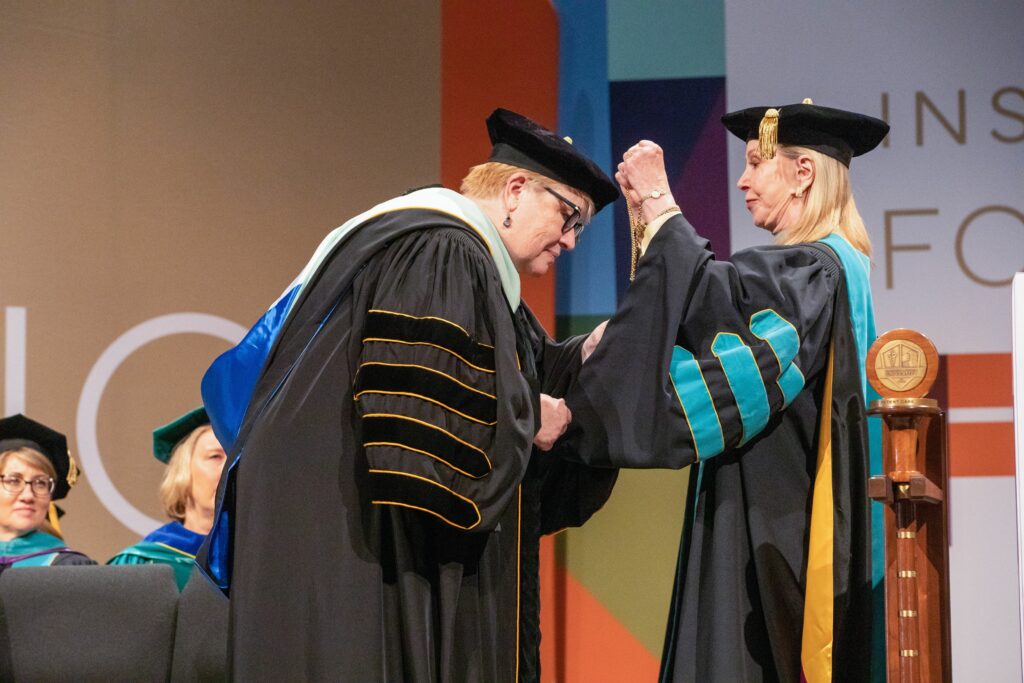When Julie A. Schornack, OD, MEd, was installed as only the second president of Marshall B. Ketchum University (MBKU) in late April, she also accepted the mantle of being its first female president. Initially, she was hesitant to embrace the “first female” moniker. After all, women have comprised the majority of most optometry school students nationwide for most of the past decade, and women are appearing in leadership positions in greater numbers. Yet representation matters. “It’s a big deal to our student body. It’s a big deal to my daughters,” she says, noting that the “first” label doesn’t define her but does certainly deserve the historic footnote.
She will not rest on her laurels, however, as there’s work to be done. She’s taking over from a successful prior president and sees an opportunity “to take the baton and expand on the efforts. We’ve added facilities and upgraded the technologies inside of those, but we have some aging facilities on campus,” she says. So a capital campaign that will provide for improving older academic facilities and a downtown Los Angeles clinic are high on the priority list.


A STRONG FOUNDATION
In addition, “we have been purposeful and focused on the programs that we have added,” she says. The 10-year-old independent, private, non-profit institutions includes three primary schools: Southern California College of Optometry, which Dr. Schornack has called home as optometrist and educator for nearly 40 years; School of Physician Assistant Studies; and the College of Pharmacy.
While working to improve the clinical experiences for students – and patients – in the community, Dr. Schornack is also focused on sustaining a strong program. Nationwide, undergraduate enrollment is dropping, “so we have to take admissions and recruitment seriously to ensure that we are bringing in talented and top-notch faculty and students,” she says.
TRENDS IN EDUCATION
More universities are offering students the interprofessional educational experiences that MBKU does. “We want our students to see that they’re valuable health care team members and create shared experiences for them so that they’re not siloed or isolated,” Dr. Schornack says. When students have that interprofessional collaboration as part of their education, “they carry that with them,” she says.
That becomes important as optometrists and other health care professionals battle for recognition and parity. As optometry schools and colleges add to the clinical and technological knowledge in a packed four-year curriculum, students today are graduating with greater skills and knowledge – but they’re still graduating into a field where legislative battles linger. For universities and college, that requires ongoing curriculum review to balance knowledge, technology and scope expansion with what can fit.
“Students graduating optometry school today are so well prepared, but my heart is heavy for them. The content we deliver in a four-year program and the clinical experience we demand of them is weighty. Students and faculty today are talking about treatments that did not exist when I went through school,” she says.
AN EXCITING TIME
That is also what makes education so exciting. “Niche areas continually come up, and students can focus on what they like. We are trying to provide rich and diverse clinical experiences so that students come out having a sense of the scale of the opportunities before them,” she says.
At the same time, schools are also working with students to prepare them for leadership and engagement. MBKU, for example, offers a leadership credential so that students learn how to advocate for the profession and help it transform as the industry and health care environment does.
Dr. Schornack says that the opportunity to become president of MBKU was an unexpected journey for this stage of her career. But as she looks forward at all the changes coming and the ongoing explosion of technology, she expects her goals for her tenure will keep her busy. “I am grateful for the opportunity, and I am thrilled to be a part of this compelling new chapter in the history of the institution.”
Photos courtesy of Marshall B. Ketchum University.
Women In Academic Leadership
Read out story with Dr. Jenny Coyle who became president of Pacific University.
Read more about the leaders at the nation’s schools and college of optometry.



